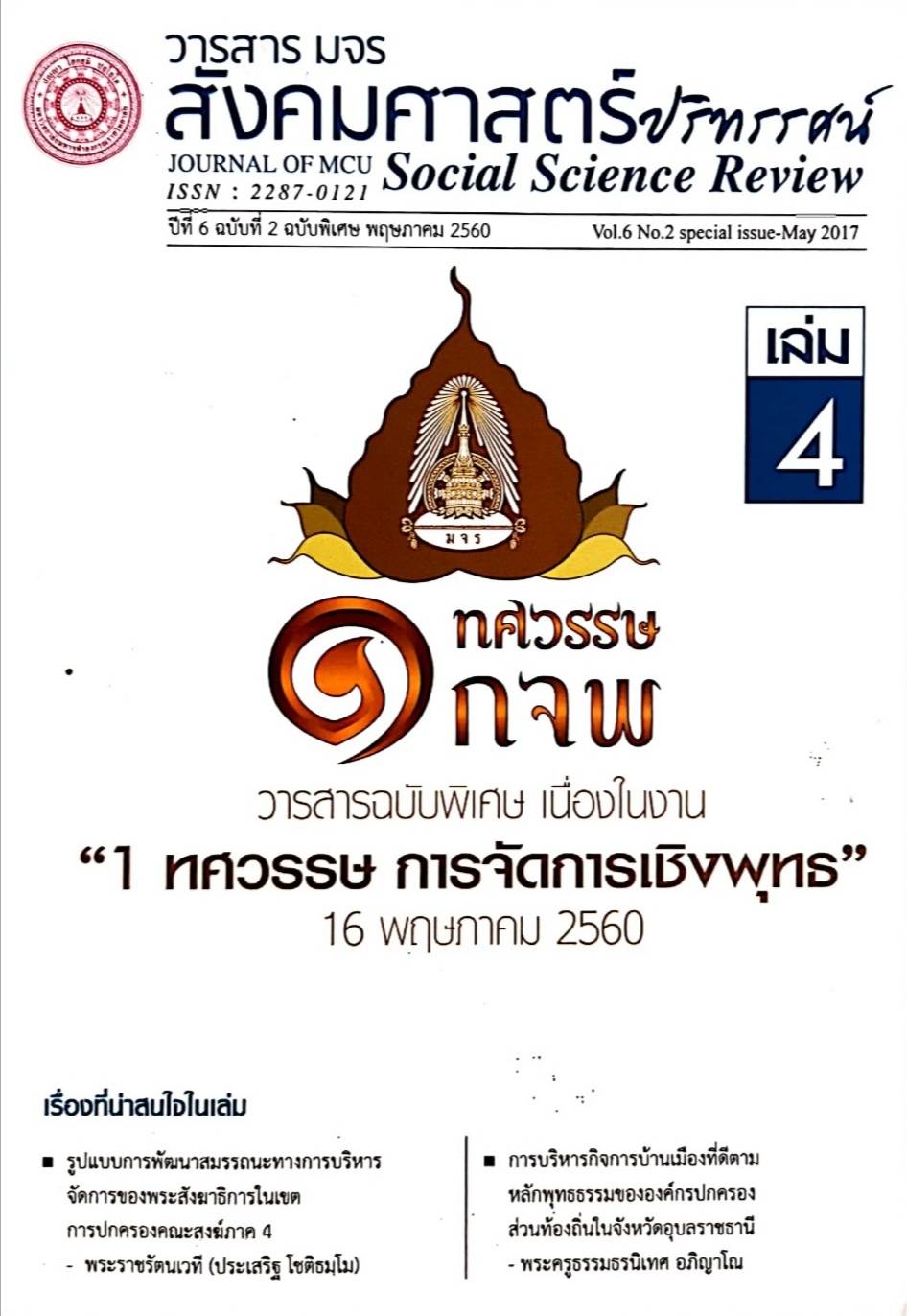รูปแบบการบริหารงานแบบมีส่วนร่วมตามหลักอปริหานิยธรรม ของเทศบาลตำบลในจังหวัดสุรินทร์
คำสำคัญ:
รูปแบบ, การบริหารงานแบบมีส่วนร่วม, เทศบาลตาบลบทคัดย่อ
การวิจัยครั้งนี้มีวัตถุประสงค์เพื่อ 1) ศึกษาสภาพทั่วไปของการบริหารงานแบบมีส่วนร่วม
ของเทศบาลตาบลในจังหวัดสุรินทร์ 2) ศึกษาแนวคิด ทฤษฎีเกี่ยวกับการบริหารงานแบบมีส่วนร่วม
และหลักธรรมที่ใช้ในการบริหารงาน และ 3) เพื่อนาเสนอรูปแบบการบริหารงานแบบมีส่วนร่วม
ตามหลักอปริหานิยธรรมของเทศบาลตาบลในจังหวัดสุรินทร์ ผลการวิจัย พบว่า
1. สภาพทั่วไปของการบริหารงานแบบมีส่วนร่วมของเทศบาลตาบลในจังหวัดสุรินทร์
พบว่า การบริหารงานแบบมีส่วนร่วมของเทศบาลตาบลในจังหวัดสุรินทร์โดยรวมอยู่ในระดับมาก
เมื่อจาแนกเป็นรายด้านสามารถเรียงลาดับได้ ดังนี้ ด้านการมีอิสระในการปฏิบัติงาน มีระดับสูงสุด รองลงมา คือ ด้านเป้าหมายและวัตถุประสงค์
ร่วมกัน ด้านความผูกพันและที่อยู่ในระดับสุดท้ายคือด้านการไว้วางใจกัน 2. แนวคิด ทฤษฎีเกี่ยวกับการบริหารงานแบบมีส่วนร่วมและหลักธรรมที่ใช้ในการ
บริหารงาน ได้แก่ การบริหารงานแบบมีส่วนร่วมมี 4 ด้าน คือ 1.ด้านการไว้วางใจกัน 2.ด้านความผูกพัน 3.ด้านเป้าหมายและวัตถุประสงค์ร่วมกัน 4.ด้านการมีอิสระในการปฏิบัติงาน ประยุกต์ใช้กับ
หลักอปริหานิยธรรม 7 ประการ ได้แก่ 1. ด้านหมั่นประชุมเป็นเนืองนิตย์ 2. ด้านพร้อมเพรียงกันประชุม พร้อมเพรียงกันเลิกประชุม 3. ด้านการไม่บัญญัติ หรือไม่ล้มเลิกข้อบัญญัติตามอาเภอใจ 4.
ด้านการเคารพเชื่อฟังผู้บังคับบัญชา 5. ด้านการให้เกียรติ และคุ้มครองสิทธิสตรี 6. ด้านการส่งเสริมและรักษาวัฒนธรรมประเพณีอันดีงาม 7. ด้านการอารักขา คุ้มครอง ปกป้องอันชอบธรรม
3. รูปแบบการบริหารงานแบบมีส่วนร่วมตามหลักอปริหานิยธรรมของเทศบาลตาบลในจังหวัดสุรินทร์ มี 4 รูปแบบ ได้แก่ 1) รูปแบบการไว้วางใจกันตามหลักอปริหานิยธรรมของเทศบาล
ตาบลในจังหวัดสุรินทร์ 2) รูปแบบความผูกพันตามหลักอปริหานิยธรรมของเทศบาลตาบลในจังหวัด สุรินทร์ 3) รูปแบบเป้าหมายและวัตถุประสงค์ร่วมกันตามหลักอปริหานิยธรรมของเทศบาลตาบลใน
จังหวัดสุรินทร์ 4) รูปแบบการมีอิสระในการทางานตามหลักอปริหานิยธรรมของเทศบาลตาบลในจังหวัดสุรินทร์ แต่ละรูปแบบมี 3 ระดับได้แก่ 1) ระดับบุคคล 2) ระดับการปฏิบัติงาน 3) ระดับ
ผู้บริหารองค์กร และมี 12 องค์ประกอบ ได้แก่ 1) มีความรู้คู่คุณธรรม 2) ทันต่อเหตุการณ์ 3) รับผิดชอบต่อส่วนรวม 4) มนุษยสัมพันธ์ที่ดี 5) การรวมพลัง ปรองดอง สมานฉันท์ 6) นาหลักการ
และหลักธรรมชี้นาองค์กร 7) มีระเบียบวินัย ใช้ชีวิตสมดุล 8) ปฏิบัติหน้าที่ตามฉันทามติ 9) ใช้หลัก ธรรมาธิปไตย 10) มีจิตสานึกที่ดีต่อสังคม 11) ใช้ความสามารถปฏิบัติงานให้มีประสิทธิภาพ 12)
หลักการบริหารจัดการที่ดี
เอกสารอ้างอิง
Community Development In Eyes on Democracy: National and Local
Issues, N Ratchmarit, ed. King Projadhipok’s Institute, Bangkok: AP Graphic
Design &Printing.
Sirilak Suwanwong, (1995).Theory and Random Sampling Technic.Bangkok: Odeon
Store, Aphinant Chantanee, (2006). Statistics for Business and Economics.
Management Graduate School, Pranakhon Si Ayutthaya Ratjabhat
University.
Argard Artsanam. (2015). “A Model of Integrated Buddhist Nurse Competency
Development of the Naval Medical Department”. Doctor of Philosophy
(Public Administration). Graduate School: Mahachulalongkornrajavidyalaya
University
Nagarin Kaeochotrung.(2013). “Forms and Principles of Government in the Tipitaka”.
Doctor of Philosophy (Buddhist Studies). Graduate School:
Mahachulalongkornrajavidyalaya University.
Narat Swadrath. (2015) “Major General “A Model of Duty Potentiality Development
for Scout Voluntary Soldiers in the Three Southern Border Provinces in
Line with the Principle of Buddhadhamma”. Doctor of Philosophy (Public
Administration). Graduate School Mahachulalongkornrajavidyalaya
University.
Sanur Assawamanta. (2015) “The Model of Administration According to Apaihaniya
dhamma of Nontaburi Provincial Administrative Organization”. Doctor of
Philosophy (Public Administration). Graduate School
Mahachulalongkornrajavidyalaya University
Vittaya Chandang. (2013) “The Development of the Model for a Strong Community
Management in Line with Sufficiency Economy in upper Central
Thailand”.Doctor of Philosophy (Public Administration).College of
Innovation Management: Valaya Alongkorn Ratjabhat University.
Wichayapa Metheeworachat. (2015) “Human Resource Development Model In Line
Buddhism of Rajabhat Universities in Lower North of the Second Area”.
Doctor of Philosophy (Public Administration). Graduate School
Mahachulalongkornrajavidyalaya University.
ดาวน์โหลด
เผยแพร่แล้ว
รูปแบบการอ้างอิง
ฉบับ
ประเภทบทความ
สัญญาอนุญาต
ลิขสิทธิ์ (c) 2020 วารสาร มจร สังคมศาสตร์ปริทรรศน์

อนุญาตภายใต้เงื่อนไข Creative Commons Attribution-NonCommercial-NoDerivatives 4.0 International License.
เพื่อให้เป็นไปตามกฎหมายลิขสิทธิ์ ผู้นิพนธ์ทุกท่านต้องลงลายมือชื่อในแบบฟอร์มใบมอบลิขสิทธิ์บทความให้แก่วารสารฯ พร้อมกับบทความต้นฉบับที่ได้แก้ไขครั้งสุดท้าย นอกจากนี้ ผู้นิพนธ์ทุกท่านต้องยืนยันว่าบทความต้นฉบับที่ส่งมาตีพิมพ์นั้น ได้ส่งมาตีพิมพ์เฉพาะในวารสาร มจร สังคมศาสตร์ปริทรรศน์ เพียงแห่งเดียวเท่านั้น หากมีการใช้ภาพหรือตารางหรือเนื้อหาอื่นๆ ของผู้นิพนธ์อื่นที่ปรากฏในสิ่งตีพิมพ์อื่นมาแล้ว ผู้นิพนธ์ต้องขออนุญาตเจ้าของลิขสิทธิ์ก่อน พร้อมทั้งแสดงหนังสือที่ได้รับการยินยอมต่อบรรณาธิการ ก่อนที่บทความจะได้รับการตีพิมพ์ หากไม่เป็นไปตามข้อกำหนดเบื้องต้น ทางวารสารจะถอดบทความของท่านออกโดยไม่มีข้อยกเว้นใดๆ ทั้งสิ้น





